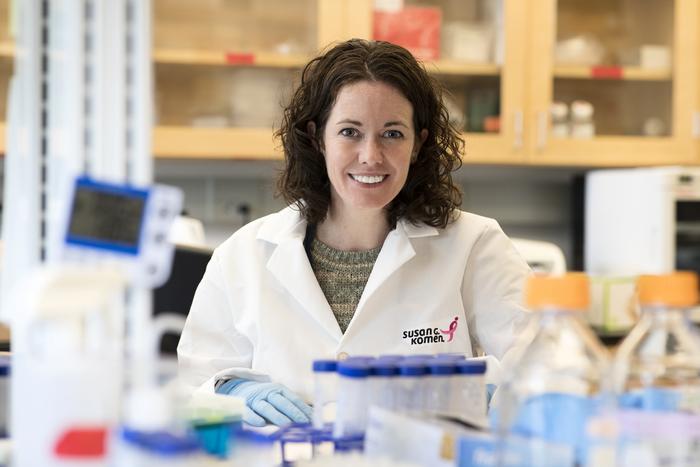
University of Virginia researchers have unveiled groundbreaking insights into the long-standing enigma surrounding the ineffectiveness of immune checkpoint therapy in ovarian cancer patients. This new research highlights the crucial role that gut bacteria play in undermining the efficacy of such treatments, ultimately offering hope for the development of more effective therapeutic strategies. The discovery is poised to potentially shift the paradigm in how we approach ovarian cancer treatment, consequently improving survival rates for thousands of women battling this formidable disease annually.
Ovarian cancer, notorious for its stealthy development and poor prognosis, continues to claim the lives of over 10,000 women each year in the United States alone. Immune checkpoint inhibitors have revolutionized cancer treatment in recent years, significantly enhancing patient outcomes for various types of cancers. However, the same cannot be said for ovarian cancer, which has remained stubbornly resistant to such therapies. The researchers, led by Dr. Melanie Rutkowski, investigated the underlying mechanisms at play, focusing on the interactions between gut microbiota and immune responses.
An unexpected element in this research is the identification of flagellin, a protein component that forms the whip-like tails of bacteria known as flagella. The research team discovered that flagellin from gut bacteria can impede the function of immune checkpoint therapy. The role of the microbiome in human health has gained significant attention in recent years, particularly concerning its influence on our immune systems. Rutkowski and her team have emphasized how the gut microbiome not only contributes to our overall health but significantly impacts the success of medical treatments, especially in the context of cancer.
Throughout their investigation, the researchers observed that the introduction of flagellin into the ovarian tumor microenvironment leads to chaotic signaling pathways that hinder immune cells from effectively navigating the tumors. This disruption in cellular communication creates a misleading environment that diverts immune responses, allowing ovarian cancer cells to thrive, instead of being targeted and destroyed by the body’s immune mechanisms. The research underscores the delicate balance between gut bacteria and the immune system, illustrating how factors that normally support health can be misinterpreted by immune cells in disease states.
The findings of this study have far-reaching implications. By elucidating the mechanisms by which gut bacteria interfere with immune therapies, Rutkowski’s team has opened doors to potential new treatment strategies. Early lab tests have shown promising results where blocking the inflammatory signals associated with flagellin restored the effectiveness of immune checkpoint inhibitors. This discovery offers a glimpse into the future of personalized medicine, where gut microbiome profiles could help predict treatment outcomes and guide therapeutic decisions.
While the research is still in its nascent stages, the implications of these findings are profound. As researchers continue to explore the complex web of interactions between the microbiome, the immune system, and cancer, there is a growing sense of optimism that these insights could lead to breakthroughs in treating not just ovarian cancer but a myriad of other malignancies that have similarly resisted immune therapies.
Furthermore, the research team’s next steps are aimed at determining precise mechanisms whereby the presence of flagellin and other microbiome-derived compounds alter immune responses in the tumor microenvironment. This research could pave the way for interventions that manipulate the microbiome—potentially enhancing the effectiveness of existing treatments while minimizing the adverse effects commonly associated with systemic therapies.
This innovative approach aligns seamlessly with the broader goals of initiatives like UVA’s TransUniversity Microbiome Initiative, which seeks to harness the capabilities of the microbiome in healing and health maintenance. Ongoing work in this area emphasizes that understanding our microbiota is not just an academic pursuit; it is a vital step toward enhancing clinical outcomes in patients suffering from various diseases, particularly cancers.
The intersection of microbiome research and oncology heralds a new era where personalized therapeutic approaches are informed by individual microbial landscapes. As a result, we may soon see treatments tailored not only to the specific tumor type but also to the unique biological context of each patient, allowing for more effective and less toxic cancer therapies. This could turn the tide against diseases that have long posed significant challenges in medical treatment.
The researchers reaffirm their commitment to advancing the understanding and application of microbiome research in clinical settings. They aim to translate their laboratory findings into viable options for enhancing the outcomes of ovarian cancer treatments through collaborative efforts with clinical oncologists and other specialties, including immunology and microbiology.
As these researchers continue to examine the intricate relationships between our bodies’ microbiomes and medical treatments, their contributions could reshape the landscape of cancer therapy while offering renewed hope to those fighting against ovarian malignancies. The culmination of these research efforts underlines a pivotal moment in oncology, shifting our focus toward the microbiome as an essential player in the battle against cancer.
Through this groundbreaking research, the studies not only illuminate the challenges inherent in treating ovarian cancer but also spotlight exciting new directions in therapeutic strategy that could lead to breakthrough advancements in patient care, ultimately saving lives and revolutionizing cancer therapy practices in the years to come.
Subject of Research: The influence of gut microbiota on immune checkpoint therapy efficacy in ovarian cancer
Article Title: Unraveling the Role of Gut Bacteria in Ovarian Cancer Treatment Failures
News Publication Date: February 11, 2025
Web References: Making of Medicine
References:
R01CA253285. National Cancer Institute
UVA Cancer Center
UVA Beirne B. Carter Center for Immunology Research
American Cancer Society
Image Credits: UVA Communications
Keywords: Ovarian cancer, Immune checkpoint therapy, Microbiome, Flagellin, Cancer treatment, Immunotherapy, Gut bacteria, Cellular communication, Personalized medicine, Oncology research
Tags: cancer treatment paradigm shiftDr. Melanie Rutkowski researchflagellin protein in cancer researchgut microbiota and cancer therapyimmune checkpoint therapy in ovarian cancerimproving ovarian cancer survival ratesmechanisms of immune response in cancermicrobiome influence on cancer therapiesovarian cancer treatment breakthroughsovercoming ovarian cancer resistancerole of gut bacteria in cancer treatmenttherapeutic strategies for ovarian cancer





